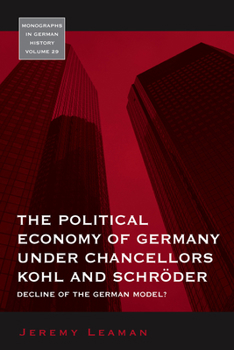The Political Economy of Germany Under Chancellors Kohl and Schröder: Decline of the German Model?
While unification has undoubtedly had major effects on Germany's political economy, the pattern of current policy-making preferences was established at an earlier stage, in particular, at the beginning of the 'Kohl-era' in 1982. This essentially neo-liberal pattern can be seen to have dominated the modalities chosen to guide Germany through the process of unifi cation and was mirrored in developments in other OECD countries and in particular within...
Format:Hardcover
Language:English
ISBN:1845456017
ISBN13:9781845456016
Release Date:July 2009
Publisher:Berghahn Books
Length:246 Pages
Weight:1.10 lbs.
Dimensions:0.6" x 6.0" x 9.0"
Customer Reviews
0 rating





